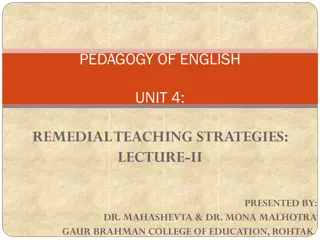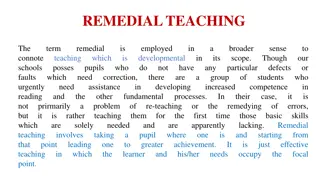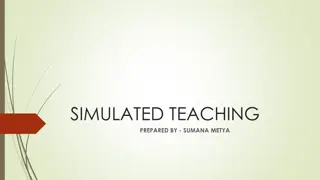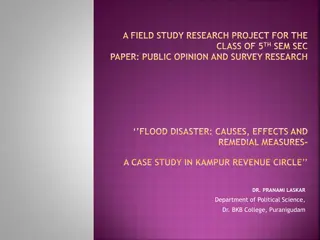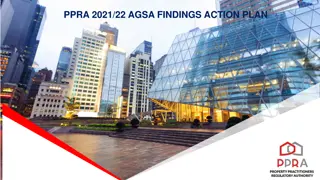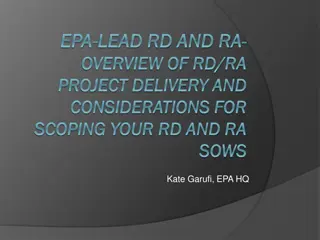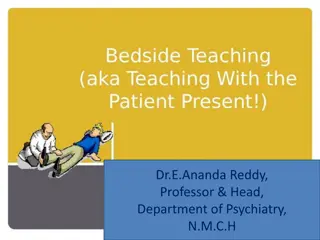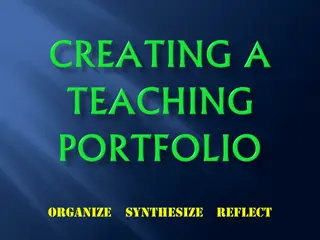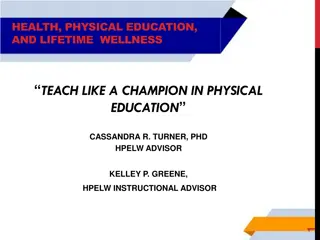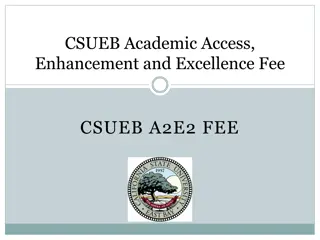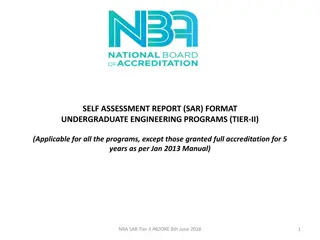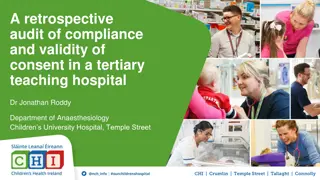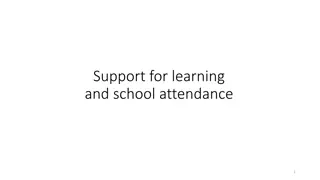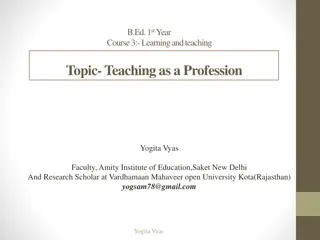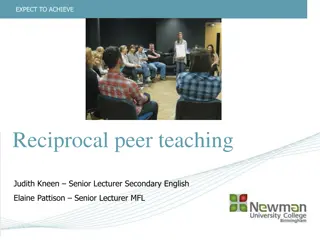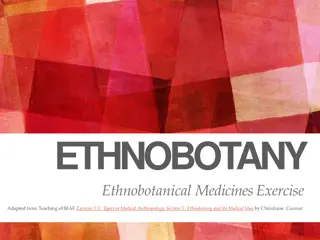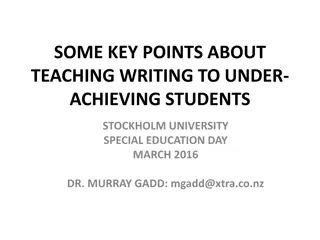Effective Remedial Teaching Strategies for Education Enhancement
Remedial teaching strategies focus on individualized education plans, peer support programs, and reward schemes to address learning difficulties and enhance students' potentials. These strategies aim to provide tailored support, reinforce foundational learning, improve communication skills, and boost motivation. Regular reviews and meetings ensure the effectiveness of these strategies.
Download Presentation

Please find below an Image/Link to download the presentation.
The content on the website is provided AS IS for your information and personal use only. It may not be sold, licensed, or shared on other websites without obtaining consent from the author. Download presentation by click this link. If you encounter any issues during the download, it is possible that the publisher has removed the file from their server.
E N D
Presentation Transcript
REMEDIAL TEACHING STRATEGIES: LECTURE-III PRESENTED BY: DR. MAHASHEVTA & DR. MONA MALHOTRA GAUR BRAHMAN COLLEGE OF EDUCATION, ROHTAK.
Remedial teaching strategy is aimed at denoting or related to special teaching, in which the learner and his/her needs occupy the focal point. Few remedial teaching strategies are: Individualized Education Programme (IEP). Peer Support Programme. Reward Scheme. Handling Pupils Language Acquisition Problems. Feedback to students, parents and teachers.
Individualized Individualized educational programme aims to reinforce the foundation of learning, helps pupils overcome their learning difficulties and develop their potentials. Individualized programme should include short-term and long- term learning objectives, learning steps, activities and reviews to ensure that the programme is implemented effectively. Teaching can be done in small groups or for individual. Teachers should hold meetings regularly effectiveness of work and gather opinions for refinement. Education Programme (IEP): educational to evaluate the
Peer Support Programme: In peer support train up students who perform better in a certain subject to become a trainer and will be responsible for helping schoolmates with learning difficulties in group teaching and self-study sessions as well as outside class. Peer support programme helps pupils reinforce their knowledge, and develop their communication and cooperation skills as well as good interpersonal relationship. To enhance the effectiveness of the programme, remedial teachers must provide training to the pupils concerned beforehand and make regular reviews on its effectiveness. Generally speaking, this programme is more suitable for pupils of higher grades. programme, remedial teachers may
Reward Scheme: The reward scheme has positive effect in enhancing pupils motivation. It aims at guiding pupils to set their own objectives and plans, and positively reinforcing their good performance. No matter what reward is provided, the most important thing is to help pupils cultivate an interest in learning and gain a sense of satisfaction and achievement during the learning process . The teacher should set clear and achievable objectives. The rewards should be changed and possess variability in order to maintain their acceptance and strength in sustaining the interest and motivation among students.
To set clear and specific targets. To set achievable objectives. To give diversified rewards (including verbal commendation) or prizes to accommodate pupils interest; give rewards instantly. To review and revise the reward scheme regularly. To invite parents to help children improve their work.
Adopting flexible instructional strategies. Drill and practice of linguistic skills. Incorporate audio and visual Materials . Development of lessons that meet students interests, needs, and experiences Development of worksheets and exercises. Providing peer tutors. Use of positive reinforcers.
Focus on learning problems one by one. Need based individual guidance programme. Feedback from peers and parents. By providing language enriching material. Incorporate individualized learning materials Describing expected learning outcomes. Regularly monitoring students progress. Constructive feedback.
Remedial teachers should make close liaison and coordination with the parents and maintain close contact with other teachers to discuss their experiences and provide and feedback to students to solve their problems. In order to help pupils with learning difficulties, schools must liaise closely with parents. Apart from providing guidance on homework to their children, parents also handle pupils problems either by the same way or similar ways in line with the requirements of schoolwork. professional support the school and their
Some parents may have unrealistic expectation of their children s performance. remedial teachers have to explain to the parents about the characteristics and abilities of pupils so that they may help their children to learn in a pleasurable manner. On the contrary, some parents expectation may be too low. Teachers must then keep in contact with parents to help them understand their children and to provide appropriate guidance to develop the pupils potentials. In such cases,
Based on educational needs of learners. Based on individual differences among class. Feedback should be provided well in time. Feedback should reference to solve specific learning problem. In positive feedback, one problem should be taken for one time. In positive feedback teacher should keep track of student progress by record keeping and genuine praise of students.


